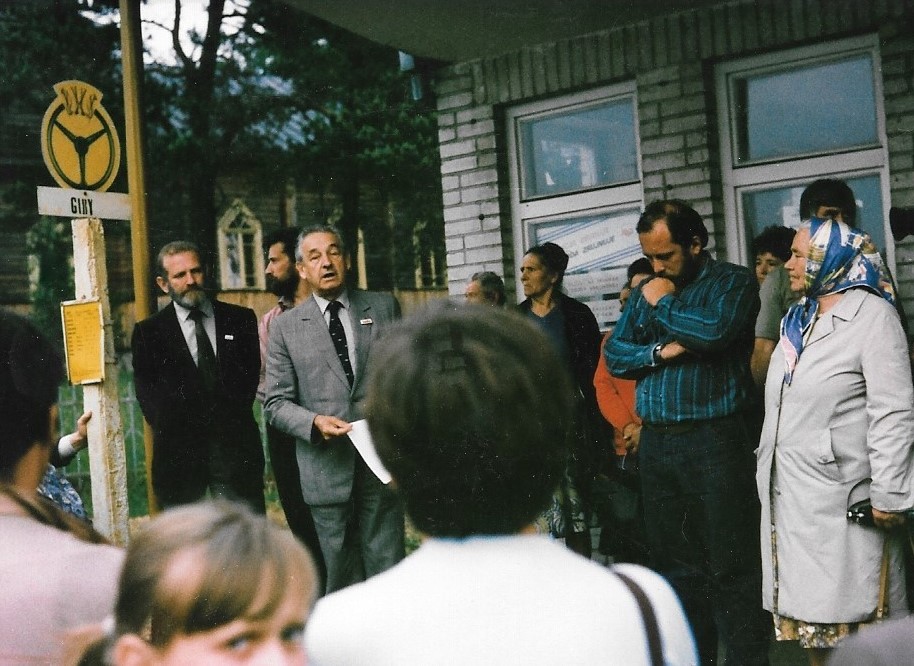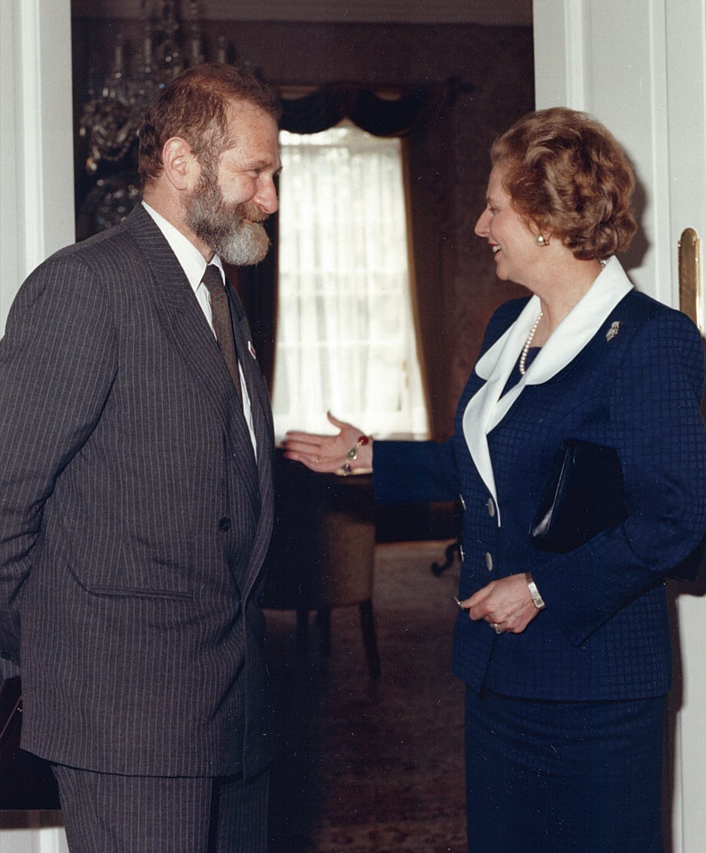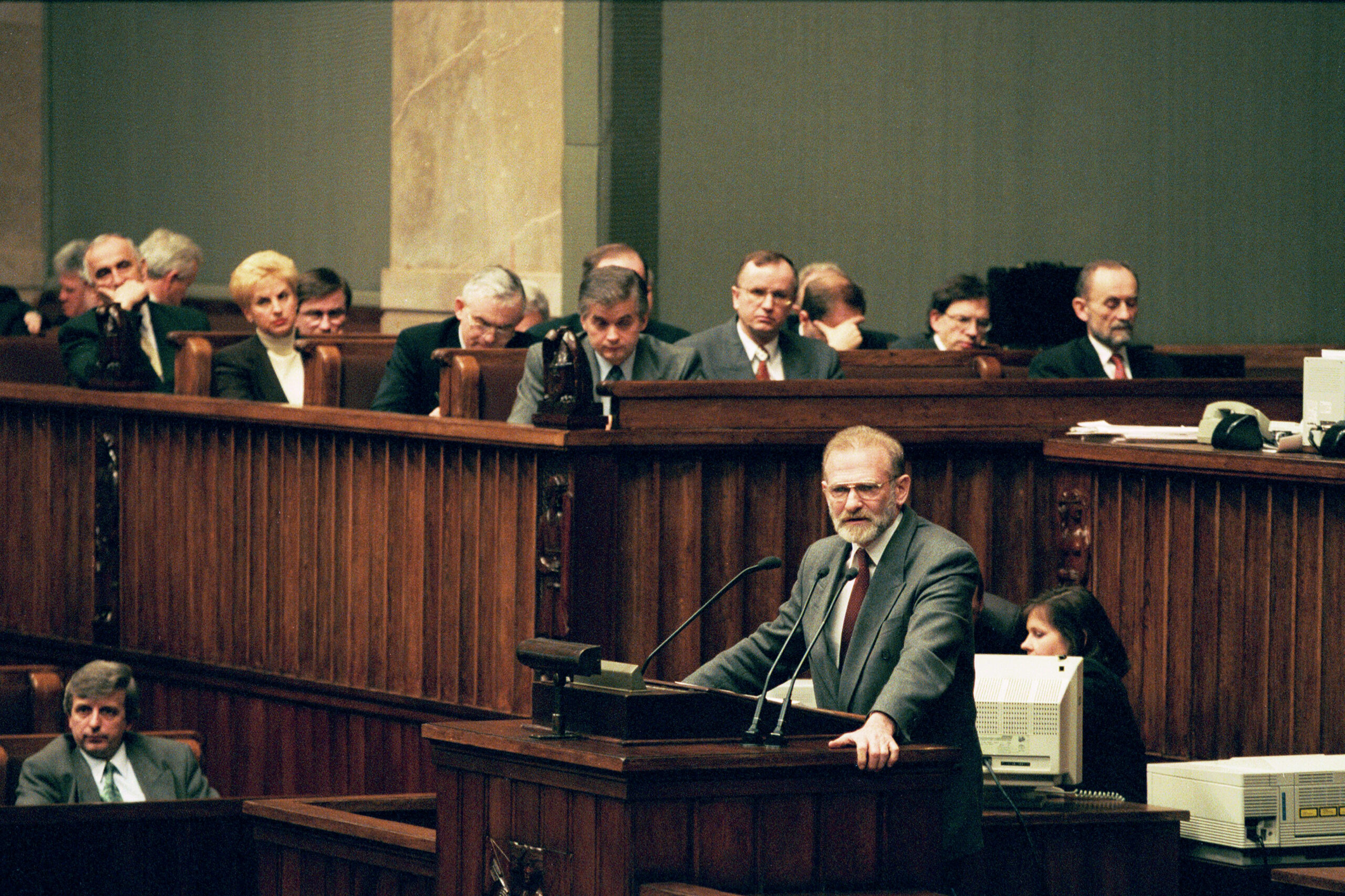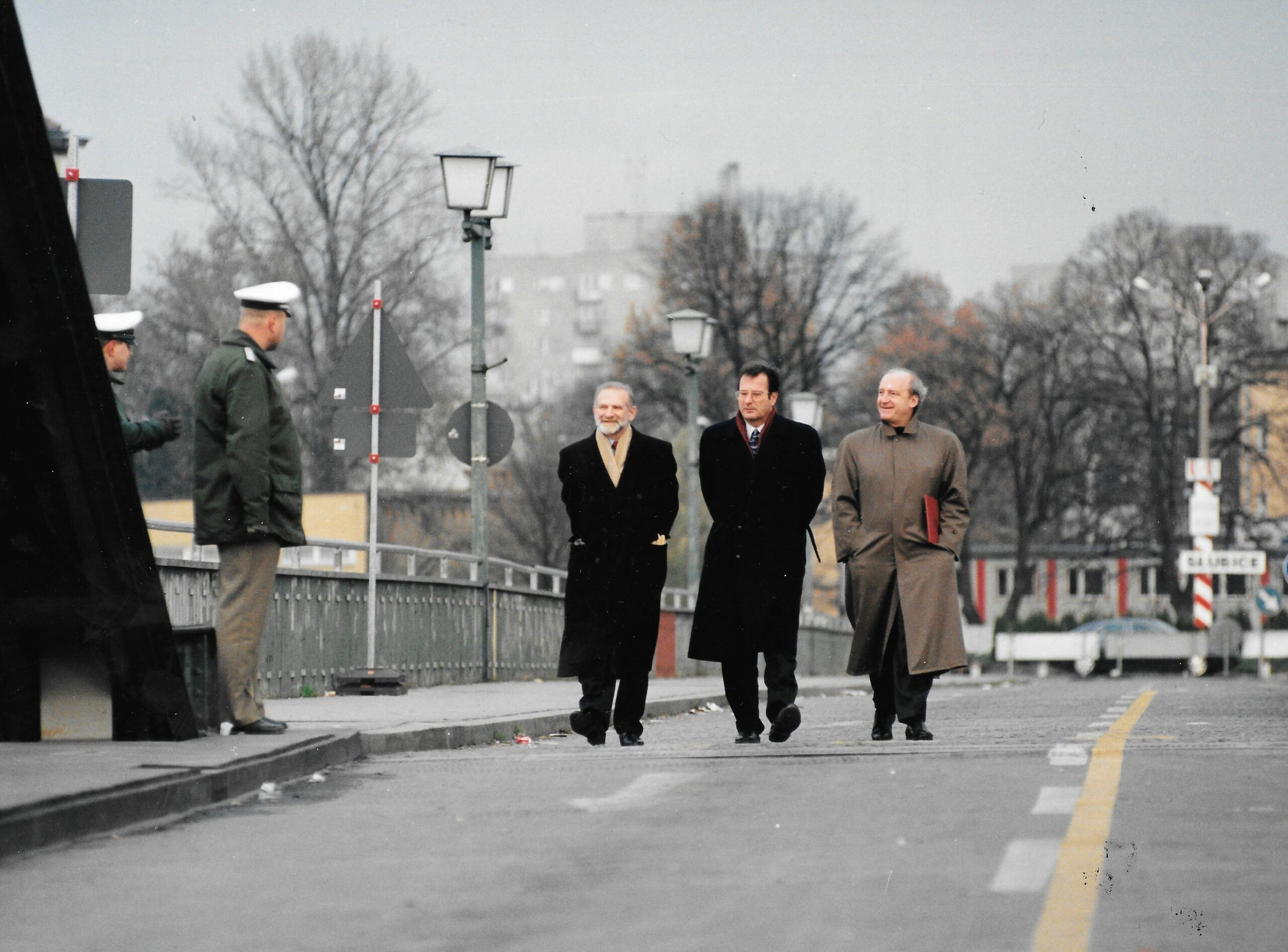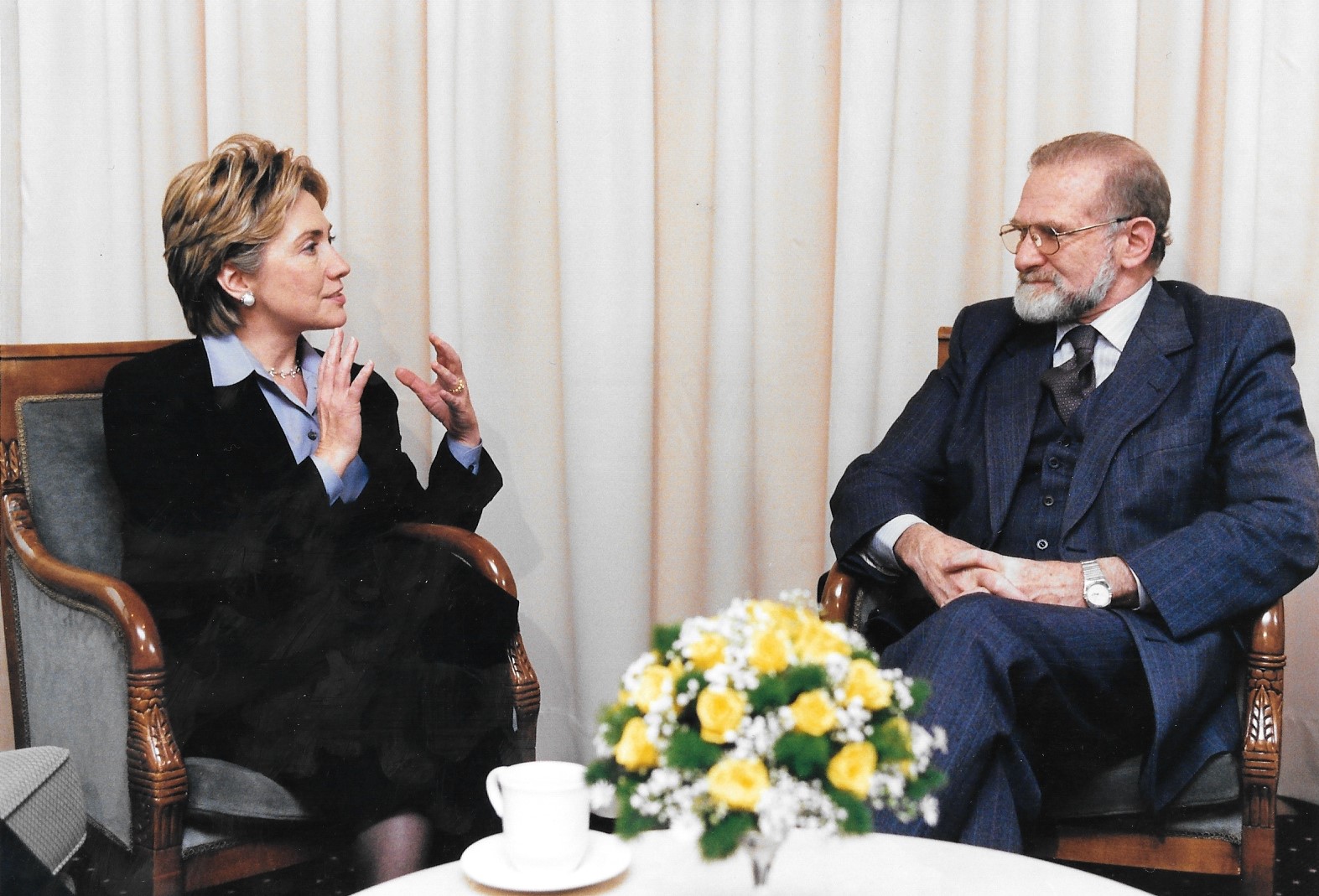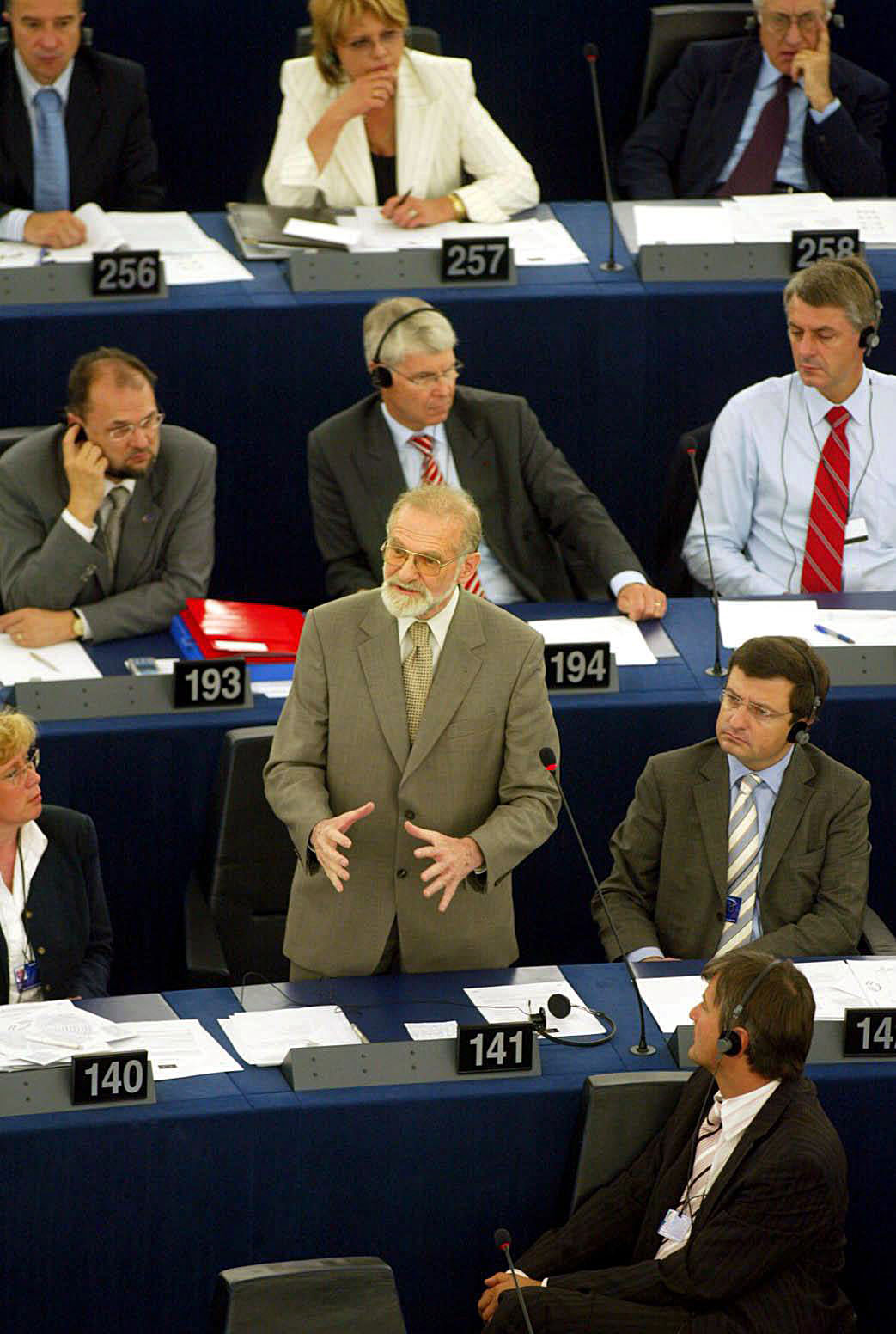Politician and statesman
On 4 June 1989, in the partially-free elections following the Round Table negotiations, Bronisław Geremek was elected to the Sejm (lower chamber of the Parliament) representing the Suwałki constituency. He remained MP continuously until 2001. Between 1989-1991, he was chairman of the Civic Parliamentary Club (OKP) and leader of the Sejm democratic majority. He also chaired the Sejm’s Foreign Affairs Committee (1989-97), the Constitutional Committee (1989-91) and the European Law Committee (2000-2001). He was also chairman of the Parliamentary Club of the Democratic Union (Unia Demokratyczna) and then of the Freedom Union (Unia Wolnosci, 1991-1997). After the parliamentary elections of 27 October 1991, he was assigned by President Lech Wałęsa to form a government, which he resigned on 14 November not being able to form a majority coalition in the Parliament.
In 1989, the US weekly ‘Newsweek’ included Bronisław Geremek among the personalities who had the greatest impact on world events (“People of the Year”, scan courtesy of Andrew Nagorski). Since 1989, thanks to his extensive network among leading political figures and opinion formers worldwide, he has contributed to the consolidation of democratic Poland in the international arena and paved the way for its membership in NATO and the European Union.
Between 31 October 1997 and 30 June 2000, he served as Minister of Foreign Affairs in Jerzy Buzek’s government. He was also a member of the European Integration Committee. In 1998, he chaired the Organisation for Security and Cooperation in Europe (OSCE) on behalf of Poland.
On 14 November 1997, Minister Bronislaw Geremek handed over a letter to the Secretary General of NATO expressing Poland’s will to join the North Atlantic Treaty and confirming its readiness to assume the obligations of membership of the Alliance. On 12 March 1999, during a ceremony at the Harry Truman Presidential Library, he signed Poland’s accession documents to the North Atlantic Treaty Organisation (video).
On 31 March 1998, he made a statement on the opening of the negotiations for Poland accession to the European Union.
He prepared the government strategy of Polish policy towards the Russian Federation, published in June 2000: “Assumptions of Polish foreign policy towards Russia”. In 1999, together with the Minister of Culture and Arts Andrzej Zakrzewski, he initiated the establishment of the Adam Mickiewicz Institute, a national cultural institution whose mission is present and promote Polish culture internationally.
Together with US Secretary of State Madeleine Albright, he initiated the creation of the Community of Democracies, a global coalition of states whose main objective was to promote democratic principles and strengthen democratic norms and institutions. The Community of Democracies was officially established during the international conference ‘Towards a Community of Democracies’, which took place in the Polish Parliament on 25-27 July 2000 with the participation of Madeleine Albright and United Nations Secretary-General Kofi Annan.
In 1998 – as the first Pole – he was awarded the Charlemagne Prize, Europe’s most prestigious award for contribution to peace and unity in Europe. He was an architect of the Polish re-unification with Europe and the rebirth of European unity symbolised by Poland’s accession to the European Union on 1 May 2004.
Following the governing coalition breakdown in June 2000, Bronisław Geremek resigned as Foreign Minister. As President Aleksander Kwasniewski said when handing him the act of dismissal from office: “To say ‘politician’ about the Professor is not enough, to say ‘patriot’ is already something much more serious, but to say ‘great Pole and outstanding European’ is to capture the essence of his achievements, his work, his attitude and the values he always wished to serve.”
Following the resignation from the government, Professor Geremek took over the chairmanship of the Sejm’s Committee on European Legislation, which coordinated the work of the Sejm and the government to implement the legal system of the European Union ahead of the 2004 accession of Poland to the EU.
From 18 December 2000 to 14 October 2001, he served as Chairman of the Freedom Union party (Unia Wolności), from which he resigned after losing the parliamentary elections. From 2002, he was seated in the National Council for European Integration.
In 2001, he was a member of the Group of Wise Men on the Future of Europe set up by Belgian Prime Minister Guy Verhofstadt. Other members of the Group included former President of the European Commission Jacques Delors, former Italian Prime Minister Guliano Amato, former Belgian Prime Minister Jean-Luc Dehaene and advisor to the British Prime Minister David Miliband. In 2002, upon request of president of the European Commission Romano Prodi, he joined the Reflection Group on Spiritual and Cultural Dimension of Europe. The Group consisting, too, of Prof. Krzysztof Michalski and Prof. Kurt Biedenkopf published a final report in 2005.
In 2002, he was awarded the Order of the White Eagle by the President of the Republic of Poland, Aleksander Kwaśniewski, in recognition of his “distinguished services to the Republic of Poland and, in particular, outstanding achievements for the democratic transition of the country and the strengthening of Poland’s position in the world.”
On 28 January 2002, he was the honorary speaker in the German Parliament before the combined chambers of the Bundestag and Bundesrat on the occasion of the German Day of Remembrance for the Victims of National Socialism. In his speech, he returned to his wartime experiences in the Warsaw Ghetto.
In the elections to the European Parliament on 13 June 2004, he was elected MEP from the list of the Freedom Union (Unia Wolności), winning the largest number of votes in the Warsaw constituency – over 114,000 – a second highest figure across the country. In the European Parliament, he was a member of the parliamentary group of the Alliance of Liberals and Democrats for Europe (ALDE). He was an ALDE candidate for the presidency of the European Parliament on 20 July 2004 – in the ballot he received 208 votes, losing to Joseph Borrell.
In the European Parliament, he sat on the Committee on Foreign Affairs and the Committee on Constitutional Affairs. He was also a member of the EU-Russia Parliamentary Cooperation Committee. After travelling to Kiev during the 2004 Orange Revolution, he advocated Ukraine’s membership of the European Union as soon as possible. In 2005, after Mikhail Khodorkovsky was sentenced to nine years in prison by a Russian court, he and ALDE President Graham Watson installed a counter in the European Parliament in Brussels presenting the number of days of M. Khodorkovsky’s imprisonment and the number of days until the end of Vladimir Putin’s second term.
In 2006, he was one of the signatories of an open letter by former Polish foreign ministers criticising President Lech Kaczyński for cancelling the Weimar Triangle summit after a critical article in a German daily. On the anniversary of the August Agreements in 2007, together with Lech Wałęsa and Tadeusz Mazowiecki, he published the Gdańsk Declaration, in which they criticised capturing of the independent state institutions and their transformation into instruments in the hands of the government then led by Jarosław Kaczyński. The Declaration called also for allowing young people to have their share in governing the country and for protecting the most vulnerable communities.
From 2006 until his death, he chaired Jean Monnet pour l’Europe Foundation in Lausanne. From 2005 to 2007, he sat on the Council of the Order of the White Eagle. Since 2000, he was an honorary citizen of the City of Wschowa, where he lived between 1945-1947.
Bronisław Geremek died tragically on 13 July 2008 in a car accident in Lubień in the Wielkopolska region on his way to the last pre-summer committee meetings of the European Parliament.
After his death, the courtyard of the European Parliament in Strasbourg was named after him becoming: The Bronisław Geremek Agora.
Sources:
Encyklopedia Solidarności: Bronisław Geremek https://encysol.pl/es/encyklopedia/biogramy/15919,Geremek-Bronislaw.html
Andrzej Friszke „Bronisława Geremka droga do wolnej Polski”, https://wiez.pl/2017/03/06/bronislawa-geremka-droga-do-wolnej-polski/
Halina Manikowska „Bronisław Geremek” https://ihpan.edu.pl/zmarli/bronislaw-geremek-1932-2008/
Magdalena Pasikowska-Schnass „Bronisław Geremek. W poszukiwaniu zjednoczonej Europy” https://www.europarl.europa.eu/thinktank/en/document/EPRS_BRI(2021)698820
Patryk Pleskot „Siła alternatywnej dyplomacji. Polityka zagraniczna „Solidarności” w latach osiemdziesiątych – rola Bronisława Geremka”, [w:] Bronisław Geremek. Ojciec polskiego liberalizmu, Warszawa 2010
Tomasz Wiślicz „Bronisław Geremek. Historyk niemarginalny”, [w:] Bronisław Geremek. Ojciec polskiego liberalizmu, Warszawa 2010
